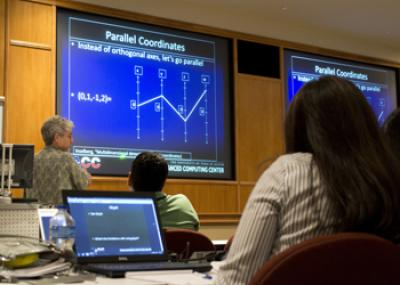ACADEMIA
Hands-on supercomputing
TACC's 6th Annual Summer Supercomputing Institute gives researchers the opportunity to use some of the world's most powerful computers
Almoutaz El Hassan, a researcher from The University of Texas at San Antonio, develops rainfall–runoff modeling tools to help officials manage issues like flood management and water conservation.
"The need for accurate hydrologic analysis and rainfall–runoff modeling tools is very necessary especially since population growth, rapid urbanization, and the expansion of agricultural activities have created very complex hydrologic and hydraulic problems," he said.
El Hassan was one of 35 researchers from across Texas and around the country who attended the 6th annual Summer Supercomputing Institute (SSI) at the Texas Advanced Computing Center (TACC). The weeklong institute introduces researchers to the role of supercomputing in 21st century science, teaches the basics of simulation, modeling and data-driven science, and provides a hands-on experience with TACC's supercomputing resources.
El Hassan's current study involves improving predictions of flash flooding. This requires high-end numerical computations to perform hydrological modeling in watersheds, as well as visualizations to transform the results into something that can be interpreted.
"Visualization of the results here is important―it's the best way to ascertain issues of flash flood scope and ground water recharge features," he said. El Hassan plans to use supercomputing to create models with more accurate abilities to predict runoff and to integrate visualization into the modeling process.
Daniel Mitchell, a full-time research assistant in Integrative Biology at The University of Texas at Austin, is another scientist who attended the institute. Mitchell's educational background is in physics and computer science, but his current investigations apply statistical modeling, network algorithms, and massively parallel computation to problems in climate change, which require the processing power of massive supercomputers. He came to the TACC SSI to meet other researchers interested in high-performance computing and to learn about TACC's resources.
Chris Hempel, TACC's director of User Services, said, "We wanted to create a training experience where diverse groups of people interested in supercomputing could learn from our instructors and from each other. The idea was to take the various short training courses TACC offers during the year, and build a weeklong institute to discuss high-performance computing systems and to introduce different visualization and data analysis techniques."
TACC is a leader in training the scientific community in the use of supercomputing resources. The center offers more than 40 training sessions each year—some lasting only half a day, others, like the SSI, stretching over a week or more. These training workshops occur at TACC's facility in North Austin, as well as on The University of Texas campus, across the country and internationally. In the past year, TACC's workshops have reached more than 1500 researchers and students.
"What makes TACC stand out," Hempel said, "is our pairing up of the wide range of topics that provide information on various aspects of supercomputing and presenting it clearly to learners with varying knowledge of computational methods. We have some of the largest resources in the country, and the TACC Summer Supercomputing Institute exposes users to these resources."
Over the past 60 years, computers have become the most important general-purpose instrument for science. "Every field of science is using computational resources and techniques to complement theory and observations," said Jay Boisseau, director of TACC, in his opening remarks to participants. "The percentage of research using computing continues to climb."
Scientists regularly use simulation, modeling and other computational approaches in meteorology, astronomy, genomics, complex physics simulations, and biological and environmental research, among many other areas.
In addition to tutorials covering topics from GPU (graphics processing unit) computing to application tuning, participants of the institute were offered one-on-one consulting sessions with the TACC experts who also teach the short courses.
"It's not just about listening to lectures for a week," Hempel said. "We believe in a hands-on approach where experts on TACC's high-end systems explain how these resources can be best incorporated to further the research efforts of the attendees."
Instructors include TACC staff from the high-performance computing, visualization, and data management and collections groups. The majority of the TACC instructors have PhD's spanning multiple domains, such as chemistry, aerospace engineering, and biology. This gives them an understanding of the underlying scientific problems that the participants are trying to solve.
The SSI attracts a diverse audience each year. Undergraduates, post-graduates, post-doctorates, faculty from universities around the world, organizations interested in knowing more about supercomputing, as well as active TACC users, participate.
"Interest in the institute has grown over the years," Hempel said. "This is the first year where we haven't been able to accept everyone due to space limitations."
Maryam Mirabolghasemi, a PhD candidate at the Petroleum and Geo-systems Engineering Department at The University of Texas at Austin, attended the TACC Summer Supercomputing Institute based on the recommendation of her advisor.
"As part of my research project, I model the formation damage near oil and gas wells due to drilling," she says. "Our preferred approach is coupled Computational Fluid Dynamics and Discrete Elements Method to cover the full range of involved physics."
Mirabolghasemi was clear about her expectations of the institute: "I'm attending to understand the basics of high-performance computing and to gain hands-on experience in parallel programming. Given that I have had little exposure to this field, I enjoy the flow of information that, for the most part, I can assimilate without having deep knowledge about supercomputing," she said.
Supercomputing is no longer just another method of analysis, but a scientific requirement that impacts the quality and pace of research and discoveries. With companies like AMD, Dell, IBM, Intel, NVIDIA, Oracle, and others all investing in major activities in Austin related to supercomputing, the future seems to belong to advanced computing.
"At TACC, we enjoy telling participants about our powerful resources," Hempel said. "The Summer Supercomputing Institute is a chance for us to explain their features to future users. If we do a good job now, there are fewer questions to answer when they come back as users."

